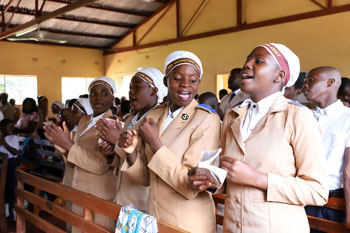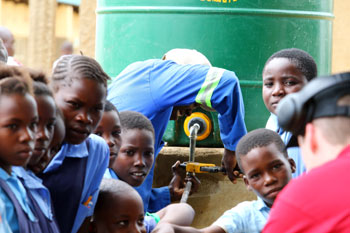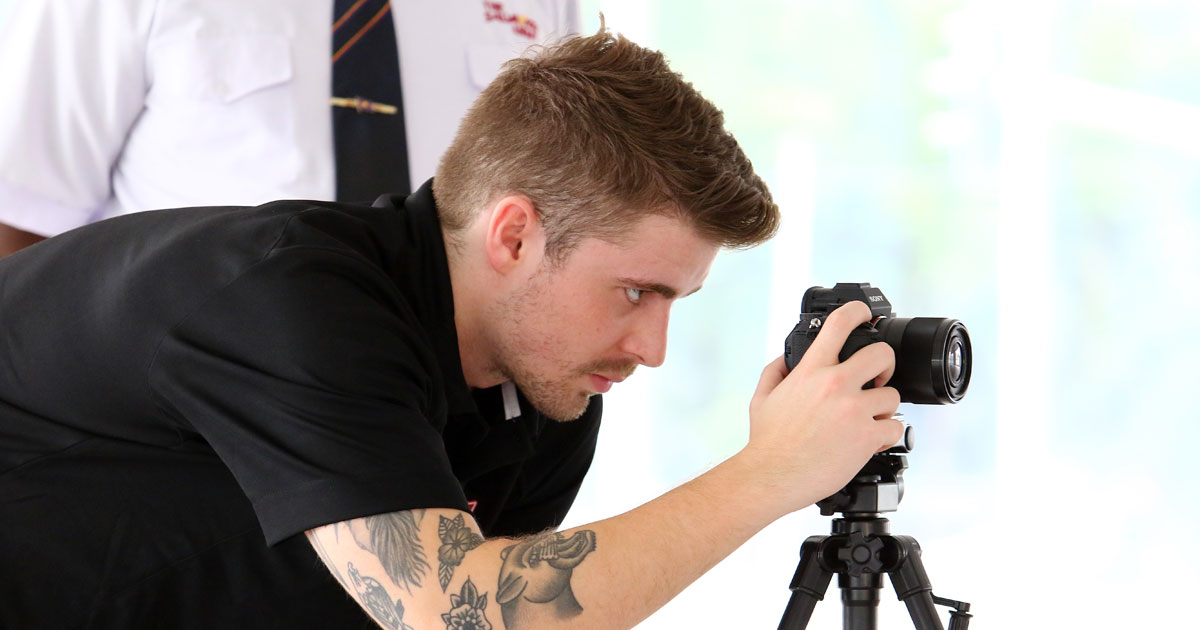On one of the last days of our campaign resource gathering visit to Zambia, our Salvation Army film crew wandered onto a field where a soccer match was going on. No fancy cleats on display, no team jerseys. Just kids of all ages kicking a threadbare ball around in joyous abandon.
As we were setting up to shoot some footage, a man started to march toward us, obviously not liking the fact that we were going to film his friends. But his intimidating manner evaporated when he saw the Army shield on our jackets. “Oh, Salvation Army,” he smiled. “You’re free to come in here whenever.”
It was at that moment that it hit me: everywhere in Zambia, people understand the good The Salvation Army is doing.
 African Adventure
African Adventure
As a Salvation Army digital media producer, I was asked to accompany a team from the world missions department on a fact-finding trip to Zambia earlier this year. I would help film a dozen or so videos that would highlight the Army’s work there.
While I was nervous about protocols for filming in public overseas, I was also excited to go as I’d never been to Africa before. Conversations with colleagues who had been on such trips before put my mind at ease.
Though the 30-hour trip from Toronto to Zambia’s capital, Lusaka, via Addis Ababa, Ethiopia, was long, I couldn’t wait to start work. Lt-Colonel Brenda Murray, director of world missions and our team leader, told me later that I always seemed to have a grin on my face. And I did!
For me, it was more of an adventure than work, despite the gruelling 16-hour-a-day pace we set for ourselves.
Earned Respect
Every day was an early start because we had four to five shooting locations on our agenda, each one telling a tale of the Army’s work. We’d assemble at the hotel breakfast bar, and the team would look to me for the overall shooting plan.
While we had a vague idea of who we were interviewing, once we got to the location, whether in a rural farm area or an inner-city informal settlement, we never knew who would show up or what was in store. But we stuck to the itinerary and everything worked out.
One of the places we visited was a Salvation Army church deep in the inner city of Lusaka, where we were privileged to take part in a church service. We also toured an Army-run school in a Lusaka informal settlement and saw hospitals in rural communities where The Salvation Army operates schools and development projects.
Even in the midst of my busyness, the setting up of interviews and filming B rolls, I couldn’t help but notice the respect Zambians have for The Salvation Army. They know the amount of development work that the Army is doing in the country, and they respect that.
 Changing Lives
Changing Lives
While the team was overseas, the COVID-19 pandemic overtook our plans and we realized that it was time to get home before the world shut down. We managed to accomplish everything on our to-do list and returned safe and sound.
I was safe. Sound? It’s one thing to read and hear about the work The Salvation Army is doing internationally, but quite another to actually see it with one’s own eyes and witness the impact being made.
On a deeper level, the trip changed my appreciation of things I had taken for granted. For instance, clean water for me was just an everyday part of life. But in Zambia, water is a matter of life or death, and the Army’s clean water initiatives are changing lives for the better in rural communities across the country.
My trip to Zambia is something I’ll never forget, especially when I think about the impact the Army has there. It makes me proud and happy to realize that The Salvation Army is helping people who need help all around the world.
As we were setting up to shoot some footage, a man started to march toward us, obviously not liking the fact that we were going to film his friends. But his intimidating manner evaporated when he saw the Army shield on our jackets. “Oh, Salvation Army,” he smiled. “You’re free to come in here whenever.”
It was at that moment that it hit me: everywhere in Zambia, people understand the good The Salvation Army is doing.
 African Adventure
African Adventure
As a Salvation Army digital media producer, I was asked to accompany a team from the world missions department on a fact-finding trip to Zambia earlier this year. I would help film a dozen or so videos that would highlight the Army’s work there.
While I was nervous about protocols for filming in public overseas, I was also excited to go as I’d never been to Africa before. Conversations with colleagues who had been on such trips before put my mind at ease.
Though the 30-hour trip from Toronto to Zambia’s capital, Lusaka, via Addis Ababa, Ethiopia, was long, I couldn’t wait to start work. Lt-Colonel Brenda Murray, director of world missions and our team leader, told me later that I always seemed to have a grin on my face. And I did!
For me, it was more of an adventure than work, despite the gruelling 16-hour-a-day pace we set for ourselves.
Earned Respect
Every day was an early start because we had four to five shooting locations on our agenda, each one telling a tale of the Army’s work. We’d assemble at the hotel breakfast bar, and the team would look to me for the overall shooting plan.
While we had a vague idea of who we were interviewing, once we got to the location, whether in a rural farm area or an inner-city informal settlement, we never knew who would show up or what was in store. But we stuck to the itinerary and everything worked out.
One of the places we visited was a Salvation Army church deep in the inner city of Lusaka, where we were privileged to take part in a church service. We also toured an Army-run school in a Lusaka informal settlement and saw hospitals in rural communities where The Salvation Army operates schools and development projects.
Even in the midst of my busyness, the setting up of interviews and filming B rolls, I couldn’t help but notice the respect Zambians have for The Salvation Army. They know the amount of development work that the Army is doing in the country, and they respect that.
 Changing Lives
Changing Lives
While the team was overseas, the COVID-19 pandemic overtook our plans and we realized that it was time to get home before the world shut down. We managed to accomplish everything on our to-do list and returned safe and sound.
I was safe. Sound? It’s one thing to read and hear about the work The Salvation Army is doing internationally, but quite another to actually see it with one’s own eyes and witness the impact being made.
On a deeper level, the trip changed my appreciation of things I had taken for granted. For instance, clean water for me was just an everyday part of life. But in Zambia, water is a matter of life or death, and the Army’s clean water initiatives are changing lives for the better in rural communities across the country.
My trip to Zambia is something I’ll never forget, especially when I think about the impact the Army has there. It makes me proud and happy to realize that The Salvation Army is helping people who need help all around the world.










Comment
On Sunday, September 27, 2020, Lloyd Hetherington said:
Leave a Comment